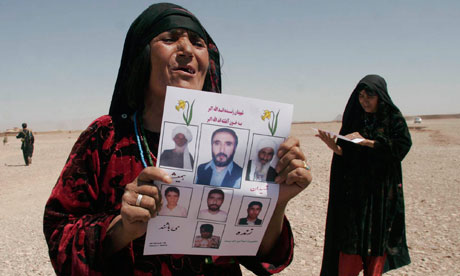- John Sloboda
Wednesday 2 March 2011 18.30 GMT
- Article history

The turmoil engulfing the Arab world has upturned so many familiar assumptions that governments (whether inside or outside the Arab region) are struggling to find some sure footholds from which to chart their stance and course of action.
One such foothold was established on 22 February by the UN security council in a moment of rare unanimity. All member states agreed on the "need to hold to account those responsible for attacks, including by forces under their control, on civilians".
Holding perpetrators to account will require a full and detailed account of what happened. Long before the security council statement, people in the midst of the chaos were taking the initiative to collect and communicate every available piece of information about who was killed, by whom, and in what circumstances.
Websites have sprung up listing details of the dead, brief descriptions of where and how they died, with photos, brief biographies and heartfelt testimonials supplied by friends and relatives. People have used all means at their disposal (including eyewitness and media reports, and information gathered by human rights organisations from hospitals and morgues) to tell the world what has happened to their loved ones. Egypt Remembers and the Killed in Libya death list are web-based projects that show what can be done by engaged citizens. No less significant are public lists of the missing, possibly dead, knowledge of whose fate is desperately sought.
Internet and mobile phone access has transformed the way that information can flow rapidly around the world, contributed to by anyone and accessible to everyone. Facebook and Twitter, designed originally for far more trivial purposes, are now achieving a profound humanitarian utility.
An informed global citizenry armed with open sources of global information means that the genie is out of the bottle as far as holding perpetrators of violence to account is concerned. A new website, Every Casualty, hosted by the Oxford Research Group, taps into this new energy. It provides information about and from the growing number of projects around the world that document casualties of conflict. Several of these projects involve the constant updating of casualty data in real time, often with tiny teams operating with almost no other resources than a laptop and a broadband connection.
The immediacy and transparency of these citizen-inspired activities should give states such as Britain and the US pause for thought. Open and transparent documentation of civilian casualties in Iraq and Afghanistan has never been a priority of either government. Indeed, as recently as September 2010 the Ministry of Defence was telling the parliamentary defence committee that "the UK does not collate, publish, or hold figures of civilian casualties in Afghanistan, because of the immense difficulty and risks of collecting robust data".
The Afghanistan and Iraq war logs published by WikiLeaks have revealed that detailed casualty data was in fact being secretly recorded by the US military since at least 2004. This demonstrates a lack of transparency rather than a lack of capacity. Yet Britain and America are now among those committed to seeing such transparency achieved in Egypt, Libya and elsewhere.
Some events have already started states down the road of greater accountability. Last May, in Geneva, 63 states – excluding the UK and the US – signed the Oslo commitments on armed violence, which commit them among other things to systematic measuring and monitoring of armed violence. Then, in November, the UN security council debated a recommendation from the secretary general that states and non-state parties should support more systematic data collection on the human costs of the use of explosive weapons. Nine members of the security council endorsed his views.
People and governments are moving towards a joint realisation that every casualty of every conflict requires documentation and memorialising, whether civilian or combatant. Such recognition is a fundamental human right. Technology has now provided us with the means to do it, and an informed global citizenry is providing the political will to ensure that it is done.
The US and the UK publish the record of their own war dead immediately, openly, and with the level of detail that properly honours each and every victim, named and identified as a unique, irreplaceable individual. All states must extend that honour to every victim of the violence currently sweeping the Arab world, and then onwards to every victim of every war.
The mechanisms and institutions for achieving this will need careful thought, but one principle is already clear. Everyone needs to pool what information they have. The habitual practice of some actors – notably states – of holding information close to their chest and refusing to share it has to stop. The death of any human being should be a matter of public record, all the more so when that death is a violent one at the hands of others.

No comments:
Post a Comment